North Carolina Central University: No Ordinary, Common Barnyard Fowl
“That audacious belief of our people – that in most ordinary men and women there reside the most extraordinary possibilities, and that, if... Read More
Discover where grit and grace built Durham's historically Black neighborhoods and find the stories, spirit and warmth that define the Bull City.
There’s no denying the robust vibrancy of Durham’s downtown area — its bustling community gatherings, hidden wine gardens and public art displays are hard to resist upon arrival. But just minutes away are gems that are home to the heart of Durham’s historic, cultural and communal foundation.
The Hayti, West End and East Durham districts contain endless riches just beyond a passing glance; here, you’ll be the steward of your own adventures. As some of Durham's most visitor-friendly, historically Black neighborhoods, these are the neighborhoods where locals have invested in a different kind of beauty since Durham's earliest days — one that is born from grit, perseverance and a deep commitment to maintaining the fabric of a city that has and continues to evolve and expand. You won’t find skyscrapers on these city blocks, but the abundant welcome of the people you’ll encounter soars to immeasurable heights.
In some ways, these neighborhoods have preserved the essence of what originally drew Durham’s entrepreneurs, artists and community leaders to build their lives here. It is the preservation of and commitment to these districts that continue to attract the best and brightest minds in the Bull City. Discover more of Durham’s unique character, just off the beaten path.
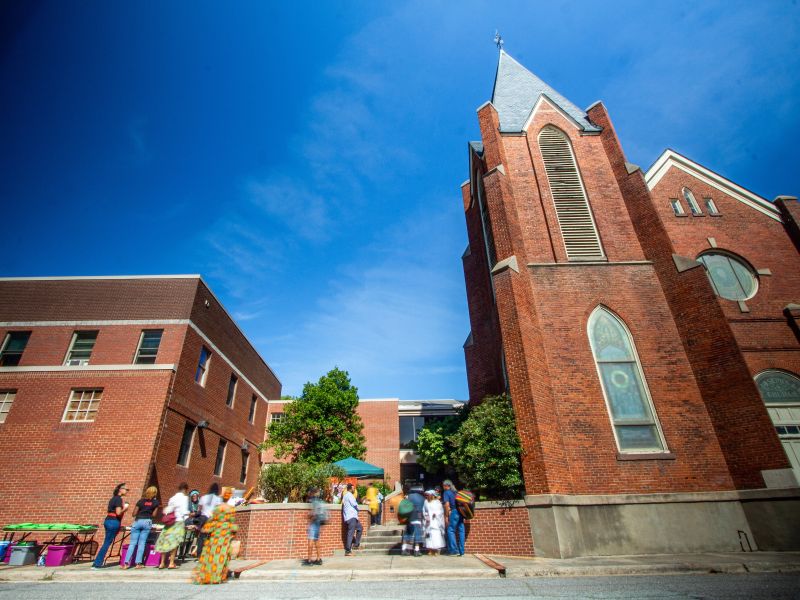
Learn about the Hayti community's roots at the Hayti Heritage Center. Photo: Discover Durham
In 1869, Preacher Edian Markum established a church and school at the intersection of Pettigrew and Fayetteville streets, which formed the nucleus around which Durham’s African American community could grow. That land became what Durhamites now call Hayti. Hayti blossomed to include a thriving, self-sufficient neighborhood of Black-owned industries of all kinds, including a library, hotel, theatre and myriad businesses. It was also home to Lincoln Hospital, started in 1901 primarily by Dr. Aaron Moore, one of the original founders of Durham's Black Wall Street. Since 1976, Lincoln has operated as Lincoln Community Health Center with a commitment to care for underserved communities to this day.
In 1958, however, both urban renewal and a newly constructed freeway to connect Research Triangle Park to downtown effectively dismantled the once-thriving Hayti community.
True to its origin story, Hayti continues to be resilient. The Hayti Heritage Center stands to preserve and advance the heritage and culture of historic Hayti and the African American experience with events, programs, and festivals. The center's 2026 season of programming ushers in a new era, one with the goal of making the Hayti Heritage Center a sanctuary of creative exploration. North Carolina Central University is just down Fayetteville Street and consistently ranks as a top Historically Black College or University with programs at the baccalaureate, master's, professional and doctoral levels.
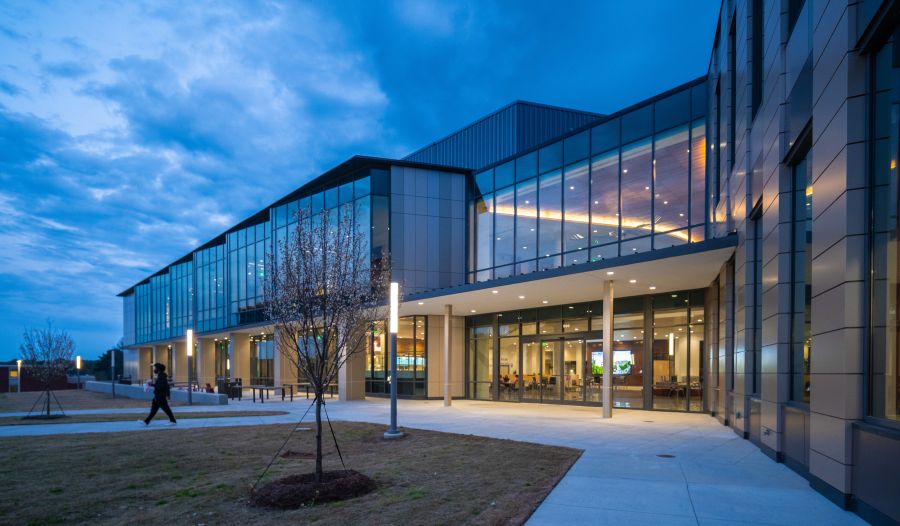
NCCU's New Student Center. Photo: NCCU
In Hayti, you’ll find a cultural event epicenter, one that is undoubtedly anchored by the Hayti Heritage Center. Outside of the regular poetry slams, open mics, history tours and art exhibits, there is the Hayti Heritage Film Festival each year in late winter — Durham’s celebration of African American heritage. This annual festival showcases diverse works by and about people of African descent, including both short and feature-length films from an international cast of directors and feature films.
In June, North Carolina's official Juneteeth Celebration brings about additional entertainment, artists, vendors, exhibitors, and multifaceted cuisine to this district.
Come for the celebratory calendar highlights, but stay for the incredible food in Hayti. Chefs making the journey from motion to mortar is a throughline here, with Black-owned food trucks making their way to storefronts. Ama’Gees Jamaican Cuisine is well known for flavorful and sometimes spicy Caribbean fare, while Nzingas Kitchen offers soul food and Cajun and Creole cuisine for breakfast, lunch and dinner. A few doors down from Nzingas, stop in Sweet Lovable Chocolates for gourmet chocolates that take dessert to another level.
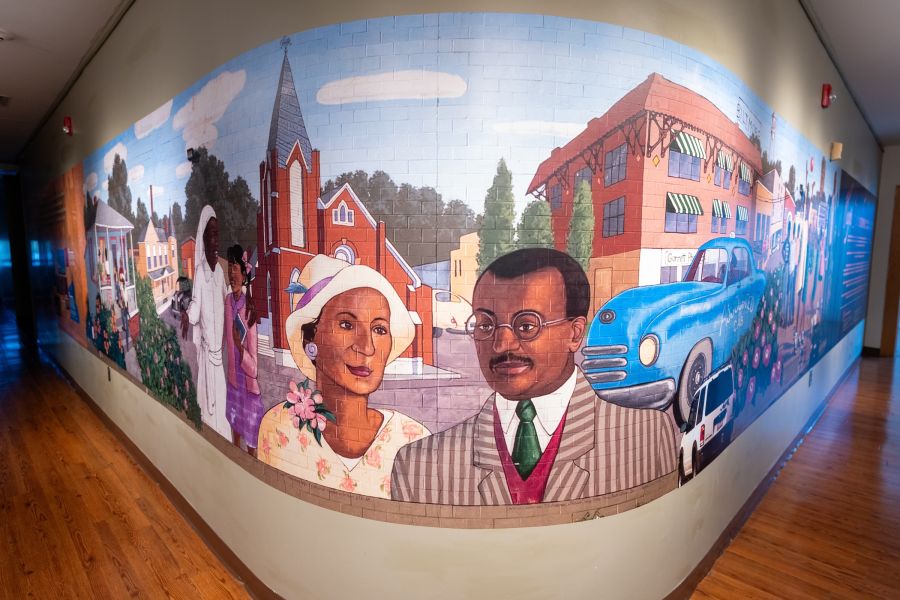
The Hayti Remembered Mural in the Hayti Heritage Center tells the history of the Hayti community. Photo: Discover Durham
Accessibility. Equity. Unity. This district in particular is unapologetic in its striving to create equal opportunity for all.
Just a few blocks from Duke University’s East Campus sits West End, one of the oldest and largest historically African American neighborhoods in Durham. Home to Pauli Murray, civil rights advocate, and Richard Fitzgerald, Durham's leading brick maker in 1884, myriad artists and business owners, and community mobilizers throughout Durham's history have lived here. In fact, Rev. Dr. Martin Luther King Jr. made many trips to Durham to inspire and organize, and it was just over a decade later that an outspoken civil rights activist, Ann Atwater, and Ku Klux Klan leader C.P. Ellis changed history as they worked together to desegregate schools in Durham. Indeed, love and liberation have always been a part of Durham’s story. In 1981, about 300 people participated in North Carolina’s first gay and lesbian march, called “Our Day Out.” Although these stories of resistance happened throughout Durham, the seeds of progress were planted in neighborhoods just like this. Community leaders, business owners, and residents old and new are fiercely protective and incredibly proud of the legacy that continues to exist here.
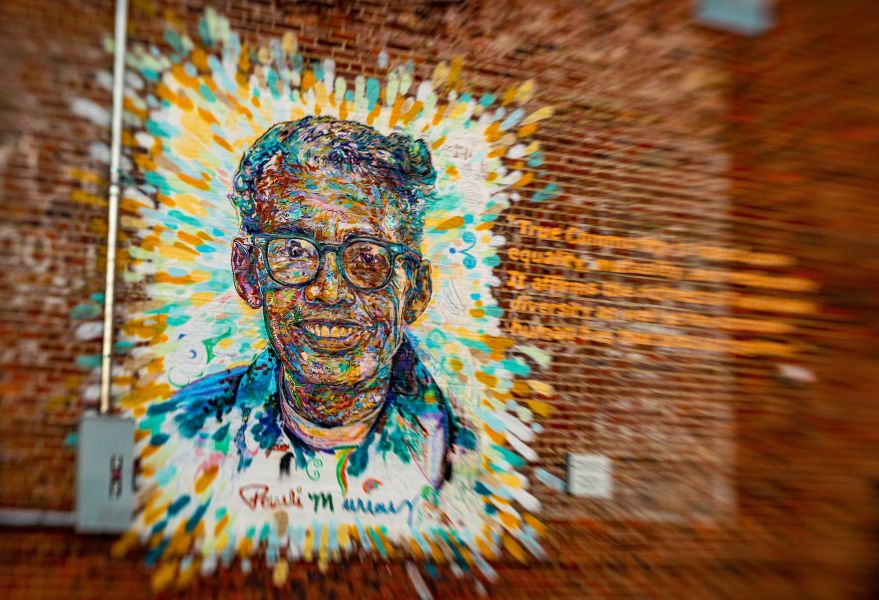
Pauli Murray Mural in the West End neighborhood. Photo: Discover Durham
In West End, history coalesces with the tastes of the moment. Immerse yourself in the essence of Durham’s historic character at the Pauli Murray Center for History and Social Justice, which reopened in 2024. It is recognized on the National Registry of Historic Places. A renovated bungalow serves as the site of Rev. Dr. Pauli Murray’s childhood home, which honors her revered life and legacy. A twentieth-century human rights activist, she was also a legal scholar, feminist, author, poet, Episcopal priest, labor organizer, and multiracial Black, LGBTQIA community member. The center regularly hosts programming in history, education, arts, and activism, and seeks to advance justice and equity. It’s a place to dig deep, uncover and rediscover sources of strength and inspiration.
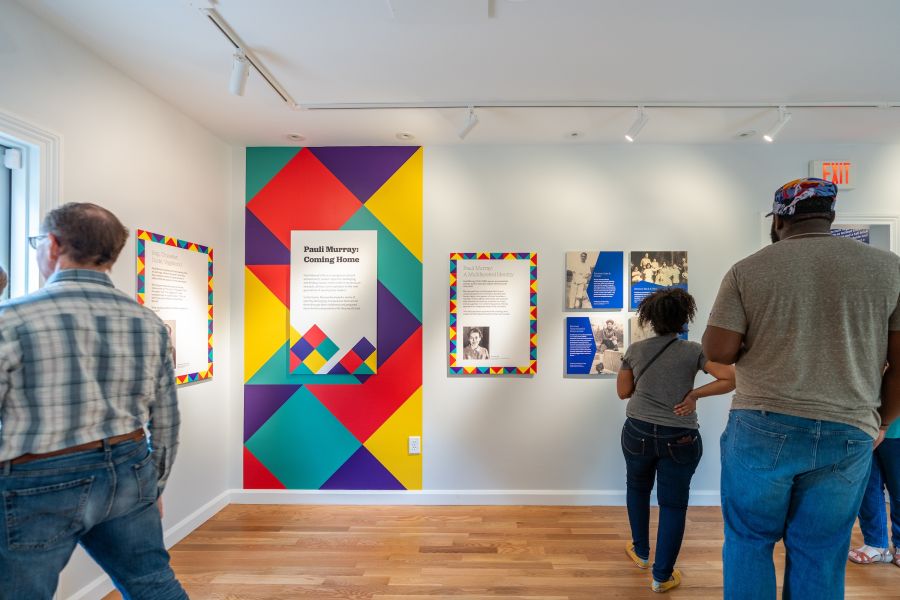
Get inspired at the Pauli Murray Center. Photo: Discover Durham
Within a short strip of Chapel Hill Street lay some delicious ways to spend the day. Bike lanes, rainbow flags, and bungalow-lined streets make this a diverse hub where diverse communities meet to dine, stroll, shop and enjoy an eclectic smattering of businesses just steps away from one another. GRUB Durham, an old gas station turned hip Southern eatery, offers plenty of outdoor seating and a menu full of delicious options like smooth grits, chicken biscuit sandwiches, and refreshing cocktails. It’s an LGBTQIA-owned establishment with open doors to everyone, including four-legged friends along for an adventure. Close by is the Durham Co-op Market, perfect for stocking up on picnic fare and locally made goods to enjoy in the lush green space of Duke’s East Campus a short walk away.
Unwind with tea and enjoy a dinner full of Middle Eastern flavor just across the street at Da Kine’s Kava and Al-Taib Halal Market, all of which are a testament to the diverse and intercultural offerings available to enjoy. Within view is The Cookery, an event space and wedding venue that is perfect for hosting reunions and gatherings of all kinds. Two doors down is a stretch eclectic Durham retail and culinary experiences that make the neighborhood a destination for exploration. Grab coffee, hand-rolled bagel sandwiches and traditional pastries at Isaac's Bagels before shopping at Gibson Girl Vintage, where clothes of all types, unique homewares, and the occasional pair of vintage skates can be found. Don't forget to stop in at The Fuzzy Needle for a curated selection of vintage books, art, music and clothing.
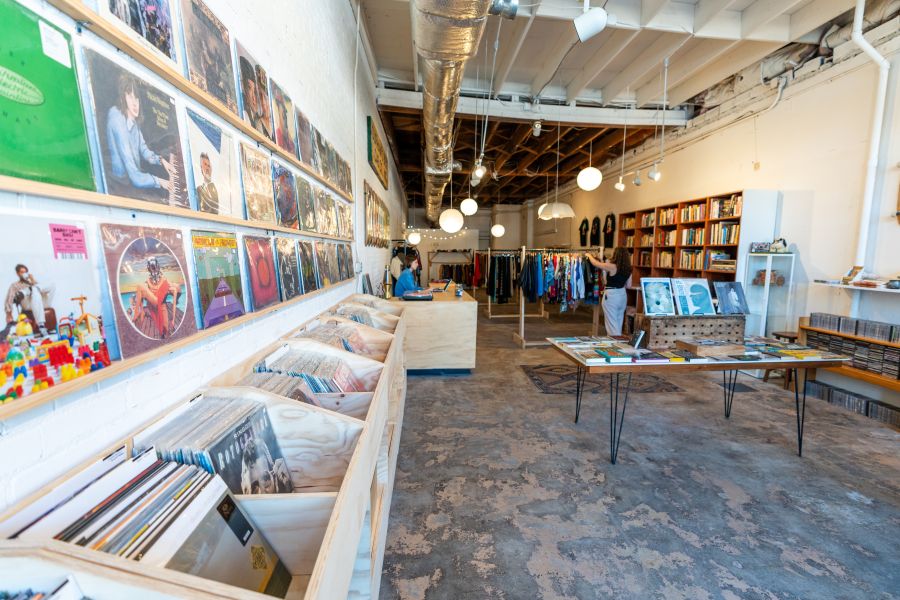
Shop for secondhand treasures at The Fuzzy Needle. Photo: Discover Durham
The West End's history doesn't end with the Pauli Murray Center and the historically Black residential neighborhood that surrounds it, it carries through to today at Morehead Manor. One of only 2% of inns in the U.S. that are Black-owned, Morehead Manor is a beautifully appointed bed and breakfast proudly family run since 1997 by Daniel and Monica Edwards. The 8,000 square-foot Southern Colonial home, built for Liggett and Myers's CEO, features four guestrooms, each with their own private bath. Morehead Manor also features a garden and a carriage house.
Despite the 1960-1990 era that brought significant destruction to other parts of Durham, East Durham remained relatively intact and thrives today at the corner of Driver and Angier Street. East Durham grew with the old Durham Cotton Manufacturing Company at its center, and at present, mature trees form canopies over the historic streets where cottages, cozy bungalows, and gable-and-wing houses still stand. In 2009, East Durham was named one of the best ‘old house’ neighborhoods in the South. A resurgence of entrepreneurship, the continued presence of faith-based communities, and its charm and historic atmosphere make this neighborhood one both locals and visitors enjoy time and again.
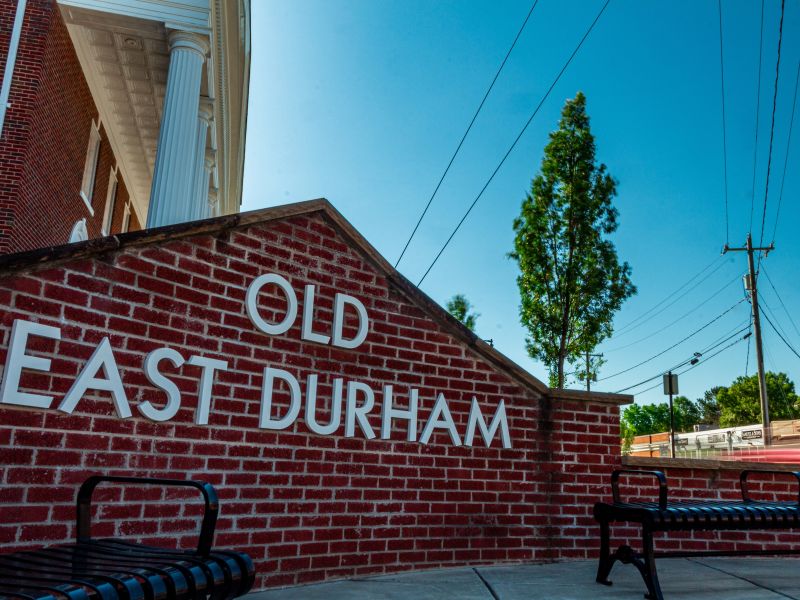
Old East Durham is home to a growing new class of entrepreneurs. Photo: Discover Durham
In East Durham, you’ll find a bright intersection nestled amid an inviting few blocks traversed by Durhamites and visitors of all ages.
Savor an indulgent brunch at longtime Durham favorite, Dame's Chicken and Waffles on Driver Street. Down the block, have a beer at Durham's first Black-owned brewery, Proximity Brewing Company. Shop at Design Bank, a curated vintage and modern furniture and home décor store, and Little Homestead Farm Natural Bath & Body, a family-owned shop with naturally nourishing soaps, moisturizers and other products. You'll also find Ideal’s Sandwich and Grocery nearby, whose hot and cold deli sandwiches often bring folks from all over to wait for divine eats on house-made focaccia in lines snaking out the door and down the sidewalk.
Next up is Sofia’s Pizza, a pizzeria with a delightful array of pies with local ties, especially the aptly named “East Durham” with applewood smoked bacon, collard greens, and fresh serrano peppers. Adventure awaits every weekend at the Durham Green Flea Market, where you’ll find churros, pupusas, and every trinket imaginable. Rich with Latine and Hispanic cultural wares and culinary treats, it’s easy to get lost for hours in the sea of colorful flags, tents and stalls.

Proximity Brewing Company. Photo: Yuri Vaysgant Photography
When you come to Durham, you come to be delighted… but perhaps you’ve also come to dare? Dare to dive deep into the heart of a destination whose stories are ready to be told. There’s no time like the present to open the chapters of these districts; Durhamites are creating new ones by the day.
North Carolina Central University: No Ordinary, Common Barnyard Fowl
“That audacious belief of our people – that in most ordinary men and women there reside the most extraordinary possibilities, and that, if... Read More
48 Hours Exploring Durham’s Black-Owned Gems
Want to explore Durham's Black-owned businesses but only have two days? Our guide has you covered. Read More
Annual Events that Celebrate Black History & Culture in Durham
The history of African Americans in Durham is as integral to our story as the mortar and brick that built the Bull City. Read More